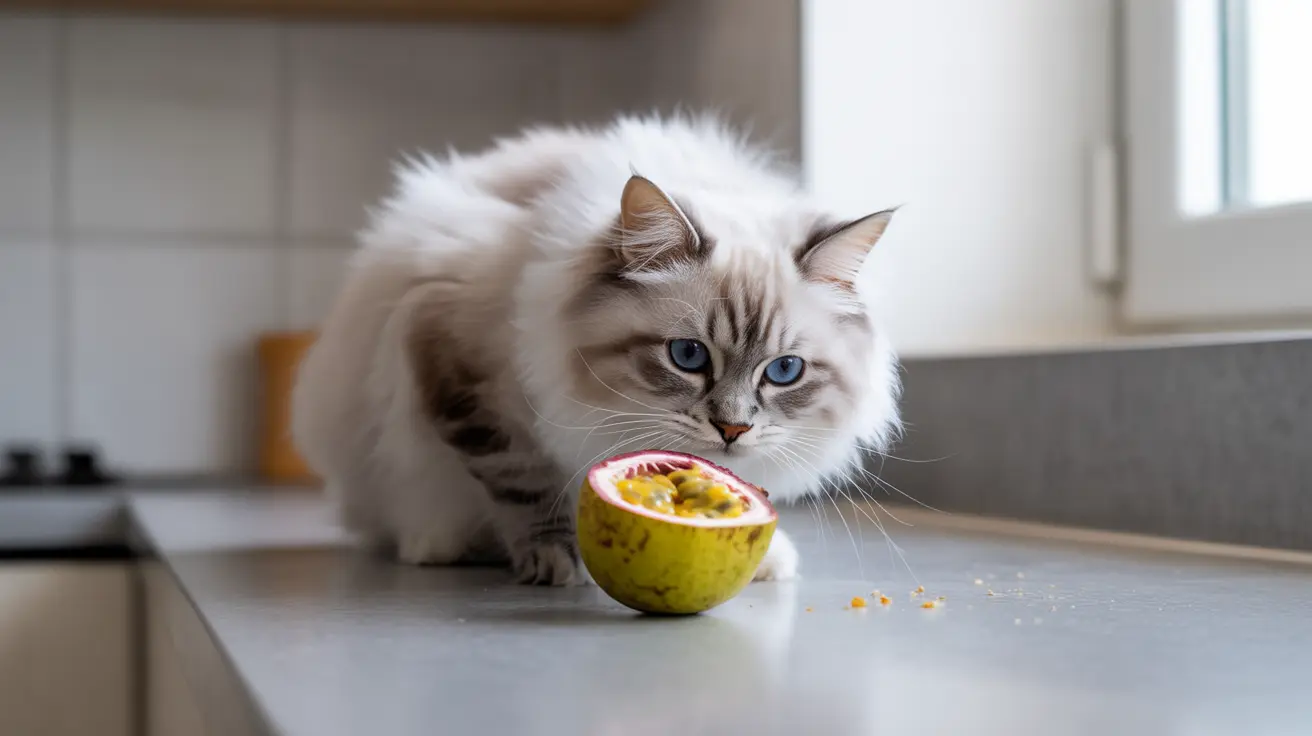The Dangers of Passion Fruit for Cats
Passion fruit contains several components that make it potentially harmful to cats:
Toxic Components
The seeds and rind of passion fruit contain cyanogenic glycosides, compounds that can release cyanide during digestion. While the flesh isn't typically toxic, the presence of these compounds in other parts of the fruit makes it too risky to offer to cats in any form.
Physical Hazards
The seeds present a serious choking risk and can cause intestinal blockages if swallowed. The tough, fibrous rind can also create digestive obstructions if consumed.
Why Cats Don't Need Passion Fruit
Natural Carnivore Diet
Cats are obligate carnivores, meaning they require a diet primarily consisting of meat. Their digestive systems aren't designed to process fruits and other plant materials effectively.
Self-Sufficient Nutrition
Unlike humans, cats produce their own vitamin C and don't require the nutrients found in passion fruit. The high sugar content can actually disrupt their digestive system and potentially lead to health issues.
Signs of Passion Fruit Consumption in Cats
Immediate Symptoms
If your cat has consumed passion fruit, watch for these warning signs:
- Vomiting
- Diarrhea
- Lethargy
- Excessive drooling
- Difficulty breathing
- Gastrointestinal discomfort
Long-term Concerns
Regular exposure to even small amounts of passion fruit could lead to chronic digestive issues and other health complications. It's crucial to prevent any access to the fruit or plant.
Safe Fruit Alternatives for Cats
If you're looking to offer your cat fruit treats, consider these veterinarian-approved options:
- Small pieces of banana
- Peeled apple (no seeds)
- Blueberries
- Watermelon (no seeds)
- Cantaloupe
Remember that any fruit should make up no more than 2% of your cat's total diet and should always be offered in small, manageable pieces.
Prevention and Safety Measures
To protect your cat from passion fruit exposure:
- Keep passion fruit plants out of your home and garden
- Store passion fruit securely where cats cannot access it
- Clean up any fallen fruit immediately
- Inform family members and visitors not to feed passion fruit to your cat
Frequently Asked Questions
Can cats safely eat the flesh of passion fruit, or is it toxic to them?
While the flesh itself isn't typically toxic, it's best to avoid feeding passion fruit to cats entirely. The risks of accidental seed or rind consumption are too high, and the fruit offers no nutritional benefits for cats.
What health risks does passion fruit pose to cats if they eat the seeds or rind?
The seeds and rind contain cyanogenic glycosides that can release cyanide during digestion. Additionally, they pose choking and intestinal blockage risks. Both conditions can be life-threatening and require immediate veterinary attention.
What symptoms should I watch for if my cat accidentally eats passion fruit?
Watch for vomiting, diarrhea, lethargy, difficulty breathing, excessive drooling, and signs of gastrointestinal discomfort. If you notice any of these symptoms, contact your veterinarian immediately.
Are there any fruits that are safe and healthy to give cats as treats instead of passion fruit?
Yes, cats can safely eat small amounts of certain fruits like bananas, peeled apples (no seeds), blueberries, and watermelon (no seeds). Always introduce new foods gradually and in small quantities.
What steps should I take if my cat ingests passion fruit or its plant parts?
If your cat consumes any part of passion fruit, contact your veterinarian or the Pet Poison Helpline immediately. Monitor your cat closely for symptoms and follow professional medical advice.
Remember, when it comes to your cat's diet, it's always better to err on the side of caution. Stick to veterinarian-approved foods and treats to ensure your feline friend's safety and well-being.






